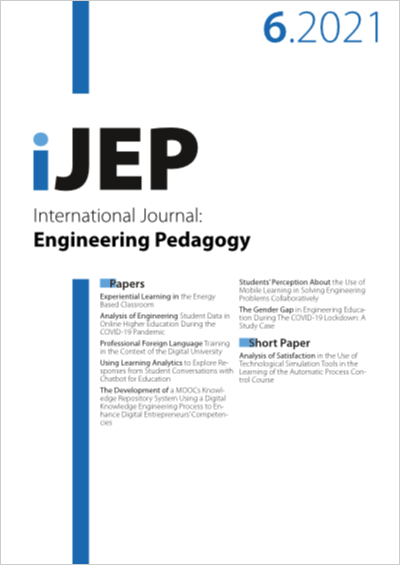Experiential Learning in the Energy Based Classroom
DOI:
https://doi.org/10.3991/ijep.v11i6.16539Abstract
Engineering technology students revel in enhanced learning experiences that include the use of hands-on methods to teach the real-world usage of the tech-nical material. These learning experiences increase applied knowledge and retention in these students and others in related STEM fields. Using research-based learning theory in a project-based and team-based learning environment, the course developers transformed the learning experience from sterile lecture type courses to interactive experiences that enhance and build on the course concepts. Surveys were used to further delve into student perception of the learning experience providing faculty with an assurance that students have ful-ly developed a level of competency in the desired topic used in the interven-tion. The goal of this research is to further delve into the use of personalized learning to engage and encourage student growth. Course developers incorporated known practices of team and project-based learning theory when making changes to the course foundation. The application of project-based learning theory is based on literature reviews, and the results seen within similar technology and engineering based STEM disciplines. Course surveys were used to collect information from the students to further understand how changes to the course delivery impacted them and affected the learning environment. Initial results suggest improved student engagement, and engagement with course materials as a result of the transformation of class delivery. Evidence shows that the classroom experience is enhanced by this type of activity. Sup-porting findings by researchers in other areas show that experiential or active learning improves students’ understanding and engagement with concepts taught through project-based learning methods.
Downloads
Published
2021-12-06
How to Cite
Maynard, C., Garcia, J., Lucietto, A., Hutzel, W., & Newell, B. A. (2021). Experiential Learning in the Energy Based Classroom. International Journal of Engineering Pedagogy (iJEP), 11(6), pp. 4–26. https://doi.org/10.3991/ijep.v11i6.16539
Issue
Section
Papers
License
Copyright (c) 2021 Cole Maynard, Jose Garcia, Anne Lucietto, William Hutzel, Brittany A Newell

This work is licensed under a Creative Commons Attribution 4.0 International License.


